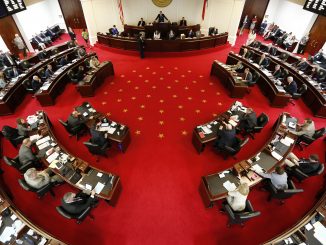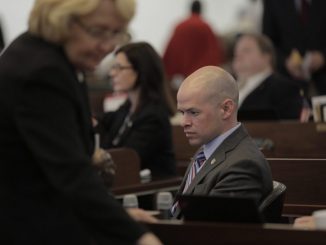
ALBEMARLE — On Jan. 9 in Raleigh, the new legislative class was sworn in, including a couple fresh faces representing Stanly County. Sen. Carl Ford (R-Kannapolis) of Senate District 33 and Rep. Wayne Sasser (R-Albemarle) of House District 67 are new to the Stanly County delegation.

Rep. Ken Goodman (D-Rockingham) of House District 66 will continue to represent some areas east of Albemarle, while the remainder of the county is now represented by Sasser, who defeated longtime member of the N.C. House Justin Burr in the Republican primary. Sen. Cathy Dunn did not seek re-election in SD-33, leaving a chance for Ford, a House member at the time, to pursue the seat.
Ford told the Stanly County Journal even though he lives in Rowan County, his new Stanly County constituents will see a lot of him.

“They’ll be seeing me every month and several times a month,” he said. “I’ll keep building those connections with local leaders and businesses in Stanly.”
In terms of issues he is pursuing for his district, Ford said a major issue for both Rowan and Stanly is transportation, especially making sure the widening of 24-27 is done in a way that is respectful to local businesses and homeowners.
Sasser, who is entirely new to the legislature, and to elected office in general, is a retired Albemarle pharmacist. Sasser said after defeating Burr in the primary, he knew the conservative-leaning seat was likely his, so he began traveling to Raleigh to meet people and begin to develop relationships.

After doing some trainings and mock sessions at the legislature, “some of which was really neat, and some of which was like watching paint dry,” according to Sasser, he was officially installed at his home church, First Baptist Church of Albemarle. Sasser’s wife held the Bible for him at the church and his youngest son, who is also a pharmacist, held the Bible for him at the ceremonial swearing-in at the capital.
In terms of issues he wants to prioritize, Sasser says, “I’ve been really focusing on the opioid crisis since about 2014, and I want to keep working on that now that I’m in the legislature.”
The issue hits particularly close to home for the pharmacist. Sasser is already working with other legislators on a bill to increase penalties for those who break into pharmacies after hours to raid the narcotics. He says opioid distributors can make off with $100,000 of opioids in under a minute during a heist. And when these drugs hit the streets, they sell for many times more than that.
The 2017-18 House had a supermajority of 75 Republicans over 45 Democrats, and the Senate had a supermajority as well, with 35 Republicans and 15 Democrats. In November’s elections, Democrats gained 16 seats — enough pickups to break these supermajorities, but not quite enough to gain majorities of their own. Now North Carolina Republicans hold a 65-to-55 majority in the House and a 29-to-21 majority in the Senate.
These simple Republican majorities are not enough to override vetoes from Gov. Roy Cooper, a Democrat. Stanly County’s two Republican legislators and one Democrat mirror the split nature of state government that will require some bipartisan support to move any major legislation.



